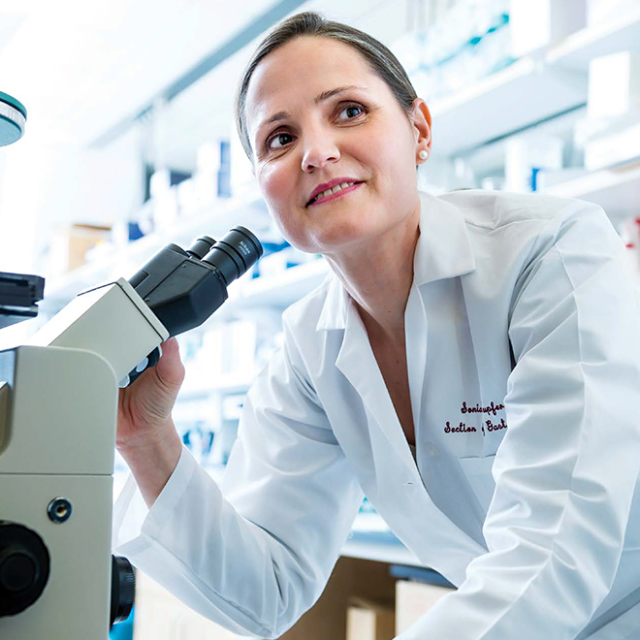
Research
The Department of Pediatrics is committed to the effective and personalized care of children and their families, the education and training of the next generation of pediatrician and pediatrician-scientist leaders, being at forefront of understanding pediatric disease and its therapy, improving the well-being of all children.
Our department’s research awards from the National Institutes of Health, Centers for Disease Control and Prevention, and other sponsors total more than $15 million annually.
Our research helps pediatricians and pediatric specialists around the U.S. — and around the world — treat children's diseases, conditions and disorders.
For help with your research study
-
300
Active Pediatric IRB Protocols
-
140
Pediatric Clinical Research Studies
-
$15M
Awarded to Investigators
-
135
Research Awards Granted
Areas of Research
Our new biorepository — a collection of human specimens and associated data — will expedite research on children's food allergies and asthma. We invite our patients and their family members to donate samples of blood, stool and DNA from a cheek swab for the biorepository research.
As part of an NIH multicenter study, our researchers are investigating whether African-Americans — the predominant population on Chicago’s South Side — are more genetically predisposed to asthma.
Comer Children's researchers found that the microbe-rich dust from Amish homes may help build the immune system in young Amish children to prevent allergic asthma. This knowledge can help us develop novel strategies to both treat and prevent chronic, non-infectious inflammatory diseases such as asthma.
Researchers in Developmental and Behavioral Pediatrics are studying how prenatal and perinatal brain injury makes a child's immature brain susceptible to long-term functional impairment. This will help us develop therapies that can help reduce the impact of the injury as they grow.
We are developing numerous research projects to help kids who use mechanical ventilation to breath avoid prolonged hospitalizations. We are hoping to identify evidence-based best practices for this population and understand how to overcome the barriers to discharging kids to home.
Our critical care team is studying how children's function, health-related quality of life, behavior and health care utilization are affected after they are diagnosed with a critical illness.
Research in Neonatology focuses on improving healthcare so we can ensure our patients are the healthiest they can be for their entire lives. Our research and care programs include care for parents, families, infants, and the ability to rapidly implement pioneering innovations in the clinic. Current projects include studying the microbiome, quality improvement, skin-to-skin contact, and sleep.
The Center for the Science of Early Trajectories studies premature infants so that we can understand biological development across the life course. Underdevelopment and maldevelopment can cause various diseases and disorders in both our preterm infants in the NICU, and our other patients in the medical center. The SET Center will solve for the root causes of these conditions, preventing them in the first place, and establishing optimal development for all our patients.
Researchers are exploring the mechanisms that control epilepsy as part of their work to discover how to stop seizures before they occur. And we're also studying live human brain tissue to develop seizure treatments. Additionally, our neurologists are researching the genetic causes of neurofibromatosis (NF) and working to create new drug therapies that could bring relief to children suffering from this disorder affecting the skin and nervous system.
The Rheumatology investigators are actively participating in studies sponsored by the Childhood Arthritis and Rheumatism Research Alliance with the aim to to conduct collaborative research to find the best methods to treat and, ultimately, discover the means to prevent or cure all pediatric rheumatic diseases.
Experts at the University of Chicago Medicine Comer Children's Hospital, in partnership with specialists from La Rabida Children's Hospital, provide comprehensive care for children with sickle cell disease and anemia. Sickle cell is an inherited disorder that affects a person's red blood cells. Children with sickle cell disease have an abnormal type of hemoglobin (the molecule in red blood cells that delivers oxygen to the body) that causes blood cells to become crescent-shaped. These misshapen cells have difficulty passing through the body's blood vessels, which reduces oxygen flow and results in tissue damage.
At Comer Children's, physician-scientists are working to develop new therapies that may prevent the development of sickle cell disease in the future as well as new protocols for current treatment options.
The pediatric cancer research program is an integral component of the renowned University of Chicago Medicine Comprehensive Cancer Center. This National Cancer Institute-designated Comprehensive Cancer Center, one of only two in Illinois, comprises an outstanding and extensive team of laboratory scientists, caregivers, clinical researchers and trainees who work together to unlock the mysteries behind all types of cancer and to develop solutions to the complexity of individual cancers. More than 50 of our current investigators — funded by federal, state and philanthropic sources — have made key discoveries that advanced the understanding of the diagnosis and treatment of leukemia. Over a 40-year time span, the comprehensive and collaborative nature of UChicago Medicine's Comprehensive Cancer Center has allowed several major advances in the diagnosis and treatment of leukemia including:
- Identifying chromosomal rearrangements that activate cancer-causing genes; this important discovery contributed to the development of current targeted gene therapies
- Distinguishing chemotherapy approaches that allow many more children to survive the riskiest forms of acute lymphoblastic leukemia
- Discovering the gene defect that contributes to a rare form of leukemia seen in children with Down syndrome; this observation is now being exploited more broadly for the development of therapies of several forms of leukemia
Ongoing research continues the quest to understand leukemia and other cancers with the goal of discerning new and better treatments for the disease. Recent grants for leukemia research are currently funding:
- A National Cancer Institute (NCI) program project grant to study the genetic basis of and therapy for secondary leukemia. University of Chicago Medicine Comprehensive Cancer Center director Michelle LeBeau, PhD, leads the NCI program.
- A Cancer Research Foundation Award to identify new leukemia targets, distinguish molecules to block those targets and develop new clinical trials using these agents. Working on this research are John Cunningham, MD, Michelle LeBeau, PhD, Kevin White, PhD, Harinder Singh, PhD, Yves Lussier, MD, and Richard Larson, MD.
At any given time, we offer more than 30 clinical trials for the treatment of leukemia. These include first line therapies, therapies for children with refractory or relapsed leukemias, stem cell transplantation strategies and new phase I drugs for leukemia.
Advancing Research Through Partnerships
Our pediatric cancer researchers are also members — and often leaders — of many national and international cancer research groups including:
- Children's Oncology Group (COG)
- American Society of Pediatric Hematology/Oncology (ASPHO)
- American Society of Blood and Marrow Transplantation (ASBMT), the Pediatric Blood and Marrow Transplant Consortium (PBMTC) and the International Blood and Marrow Transplant Registry (IBMTR)
- Pharmacogenetics of Anti-Cancer Agents Research Group (PAAR)
These partnerships and collaborations further our ability to bring the latest treatment innovations from the laboratory bench to the patient bedside as quickly as possible.
In addition to caring for patients, our physicians also are scientists who are working to advance treatments for neuroblastoma. As part of the University of Chicago Medicine Comprehensive Cancer Center, our pediatric oncology program is involved in laboratory research and also has extensive experience with clinical trials.
Clinical Trials for Neuroblastoma
The University of Chicago Medicine Comer Children's Hospital has special approval to allow some teens into adult-focused clinical trials. Beginning at age 14, patients may be eligible to participate in studies of anti-cancer agents that our physician-scientists are investigating in adults. In addition, our membership in the Children's Oncology Group connects us to more than 250 other medical centers worldwide that participate in phase 2 and phase 3 clinical trials of promising new drug therapies.
As a member of the New Approaches to Neuroblastoma Therapy (NANT) consortium, Comer Children's is one of only 14 medical centers in North America with access to phase 1 clinical trials. Physicians may recommend that patients with aggressive, relapsed neuroblastoma enroll in these trials if they have limited success with more standard therapies.
Leaders in Neuroblastoma Research
In addition to testing the effectiveness of new treatments through clinical trials, physicians and scientists here also conduct long-term studies and research in the lab. With close cooperation between research and patient care activities, discoveries made in the lab can be translated into clinical advances that may improve treatment options for neuroblastoma.
Our physician-scientists currently are investigating:
- The role of race and ethnicity in neuroblastoma outcomes
- How genetic variations appear to pre-dispose children to develop certain severe forms of neuroblastoma
- The effect of D-amino acid peptides on tumor growth
- How a patient's genotype influences his or her reaction to a drug (a field known as pharmacogenomics) and how physicians can use this knowledge to optimize treatment plans
From Laboratory Bench to Patient Bedside
Researchers at the University of Chicago Medicine are leaders in the ongoing study of the biology and genetic basis of soft tissue and bone sarcomas and other cancers. Their findings could lead to new treatments that have better outcomes and fewer side effects than chemotherapy and radiation.
"Translational" research projects in the orthopaedic surgery and radiation oncology departments are aimed at bridging the gap between the laboratory and the clinic. For example, orthopaedic surgeons Hue H. Luu, MD, Rex C. Haydon, MD, PhD, and Tong Chuan He, MD, PhD, are conducting research to understand the basic biologic mechanisms underlying why osteosarcoma forms in the first place. They are using approaches to stimulate osteosarcoma cancer cells to become normal bone forming cells. By forcing these cancer cells to differentiate (i.e. change into) bone cells, the cells become non-cancerous and are less likely to cause mortality. The laboratory is also conducting research to understand which genes control the ability of osteosarcoma cells to spread. The researchers hope to identify genes (i.e. genetic markers) that predict which patients have cancer cells that have already, or are likely to, spread to other parts of the body. Knowing this may eliminate the need for chemotherapy in a select group of patients who will never develop metastases.
Radiation oncologist Philip Connell, MD, is working to identify molecular markers of treatment resistance, and to develop new anti-cancer agents that can overcome these molecular hurdles. His new ongoing projects involve the design of new drugs that modify DNA repair. With these studies, researchers have the potential to discover new chemical compounds with wide-ranging impacts — from improving present oncology therapies to blocking the mutagenic effects (causing genetic mutations) of chemotherapy and radiotherapy.
At the Forefront of Cancer Research
Our physicians and investigators are members of the world-famous University of Chicago Medicine Comprehensive Cancer Center, an NCI-designated Comprehensive Cancer Center — a consortium of select centers leading the nation in cancer research and providing patients with more effective health care. These teams of researchers work collaboratively, across scientific disciplines, to explore and develop innovative ways to fight and cure cancer. Because of our high level of expertise and access to the latest therapies, patients from the Midwest, the nation and around the world come to our cancer program for treatment.
Clinical Trials Benefit Many Patients
The stem cell transplant physicians and researchers at the University of Chicago Medicine Comer Children's Hospital are always looking for new and better ways to treat our patients and to improve the quality of life after treatment.
All of our transplant patients are treated with protocols that are part of institutional or national clinical trials — research studies that look at transplant, infection, graft versus host disease and other aspects of this treatment.
When your child is treated at Comer Children’s, he or she benefits from previous and ongoing research studies. What we learn about your child will also help other patients in the future.
Innovations Expand Stem Cell Transplant Treatment
The teams of clinicians and researchers at Comer Children's and the Institute of Molecular Pediatric Sciences at the University of Chicago are combining clinical intervention, clinical research and laboratory investigation to explore more applications for stem cell transplantation and to improve the success rate of this promising treatment.
We are one of the small number of institutions in the nation that provide an extensive array of post-transplant immunotherapy strategies including: infusion of donor lymphocytes; natural killer cell and mesenchymal stem cell infusions; and, in some instances, the use of post-transplant chemotherapy. These approaches are reinforced by University of Chicago Medicine Comprehensive Cancer Center research programs and by the University of Chicago Biological Sciences Division programs and departments. These programs are focused on the development of novel chemotherapeutic agents for use in transplantation in malignant diseases of childhood, the use of new approaches to purify cell populations with strong activity against malignant cells and the development of tumor vaccines.
We are particularly interested in identifying new approaches to transplant children with leukemia for whom conventional chemotherapy has failed to control their disease, have relapsed after an allogeneic stem cell transplant, or who have developed a secondary leukemia after being treated earlier in life for another malignancy. These studies are supported in part by a multi-million dollar award from the Cancer Research Foundation. Approaches currently being considered for these patients include the use of reduced-intensity therapies, the combination of mismatched related and cord blood grafts and post-transplant immunotherapy.
The team has a long-term interest in developing effective and safe transplantation strategies for hemoglobinopathies and immunodeficiencies. (National awards and local philanthropy fund work in this area.) Using new graft development strategies, the team offers novel strategies for sickle cell anemia and β-thalassemia, bone marrow failure syndromes and metabolic storage diseases. Given the high degree of multi-organ involvement in these conditions, this treatment is supported by internationally known, multidisciplinary experts at Comer Children's. These experts are focused on the critical care, pulmonology, genetics and cardiovascular complications associated with effective therapy of these conditions.
-
50
Principal Investigators
-
16
PCTO Clinical Research Coordinators
-
150
Research Staff Engaged




